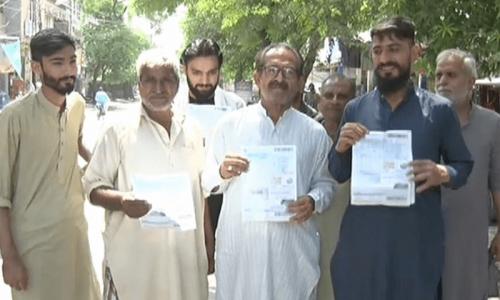• Say govt relies on revenue generated from power sector
• Point out that most IPPs owned by ‘people in power’
KARACHI: There is little hope that high electricity prices will come down in the country as the government has made electricity and petroleum products “sources of revenue generation” while the independent power producers (IPPs) are enjoying “freehand without any check and balance” over their performance, outputs and agreements signed with the government.
This was shared by experts at a media briefing — Pakistan Energy Crisis and IPPs: How Overbilling Impacts Quality of Life and Pathways to Solution — held at the Applied Economics Research Centre (AERC), University of Karachi, here on Thursday.
The experts also said that the issue of overbilling and high cost of electricity has become a crisis that is badly affecting the poor and middle income households in the country, impacting their expenditure on health, education, food, transportation, etc.
Dr Aamir Siddiqui, assistant professor at AERC, said that electricity charges are not going to come down soon because the government has made petrol and electricity a source of revenue generation. There are around 100 IPPs in the country and with that much suppliers, prices of electricity should at least be stable, if not cheaper but they are constantly increasing, he said.
He added that Pakistan is generating more power than the demand but loadshedding is still carried out. And amid all this, the government does not bother to negotiate with the IPPs or to revise the agreements with them to improve their quality and services, even though they are paid in dollars or amounts equivalent to the dollar exchange rates.
Dr Muhammad Sabir, principal economist at the Social Policy and Development Centre Karachi, said electricity tariff would not come down until the government prioritises the people over its own interests.
Most of the agreements with the IPPs, he said, were signed “without thinking” about the benefit to the public, adding that those IPPs who are not supplying power at all are also being “paid in full and on time”.
Speaking on the occasion, Assistant Professor at AERC Dr Fauzia Sohail said the major consumer of electricity is the residential sector and then the industrial and it is the residential sector, particularly the households with low and middle incomes, that are more affected by overbilling and high cost of electricity.
When electricity charges increase, people’s expenditure on health, education, food, transportation, housing, etc, decreases and affects those essential facilities badly. Not only that, a portion of low income people goes below the poverty line as it has been seen, particularly in Karachi.
Therefore, she said, the government needs to provide low income households with compensations in health and education, etc. If that is not done, it could have adverse effects on people and the country’s economy.
Speaking particularly about the issue of K-Electric, M.Phil scholar at AERC Rao Asad said the KE had “suppressed” electricity demand in the city through overbilling as it is unable to generate electricity according to the demand of the city and always tries to meet this shortfall through loadshedding.
The speakers also said that many of the IPPs in the country are directly and indirectly owned by the people who are and have been part of past and present governments and that is the reason why no strict action is being taken against those IPPs which have a very poor record.
Furthermore, AERC faculty member Dr Asghar Ali, who moderated the event, claimed that audit of IPPs was “never done” in Pakistan, which has also contributed towards the current problematic situation.
The solutions and way forward they suggested are the dire need of negotiation with the IPPs and also considering their nationalisation, financial and social support programmes for people, splitting K-Electric into separate generation and distribution companies among other crucial measures.
Director AERC Prof Dr Nooreen Mujahid and Chief Executive Officer Ataleeq Foundation Shahzad Qamar also spoke on the occasion.
Published in Dawn, August 2nd, 2024














































